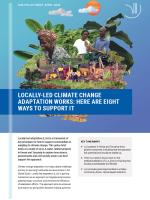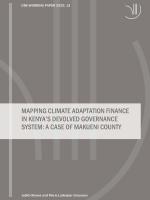Effective climate finance coordination?
The last two decades have seen an increase in climate financing channelled to the Global South from multiple sources, putting a spotlight on climate finance coordination challenges in recipient countries. However, the climate finance coordination debate has largely been centered on climate finance provision at the global level. Emerging scholarly and policy literature has called on recipient countries to establish effective climate finance coordination mechanisms. Yet, the calls have not clarified what accounts for an effective coordination mechanism.
This paper addresses the gap by analysing stakeholder perceptions of effective climate finance coordination in Kenya from the national to the local level. Kenya has instituted a legal and institutional framework to guide climate finance coordination, but challenges of coordination persist. Using the political economy framework, the paper analyses political economy factors influencing stakeholder perceptions and climate change policy implementation to identify political contestations that need to be reconciled. Data is drawn from relevant literature, 29 key informant interviews and 4 focus group discussions at the national level in Nairobi and at the sub-national level in Turkana County. Deductive thematic analysis is adopted for coding and analysing data.
Results indicate that different ideologies, interests, incentives, politics, power relations and contestation over resources largely influence stakeholder perceptions of an effective climate finance coordination mechanism and climate policy implementation. Results point towards the operationalisation of the National Climate Change Council and the National Climate Change Fund as the most contested. The paper calls on policy actors to move beyond the technical lenses when addressing climate finance coordination challenges and reconcile political issues of contention for recipient countries to institute coordination mechanisms that can gain ownership and widespread legitimacy from climate change stakeholders.
DIIS Experts





